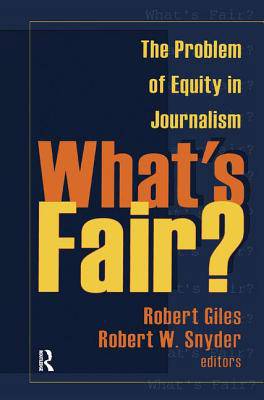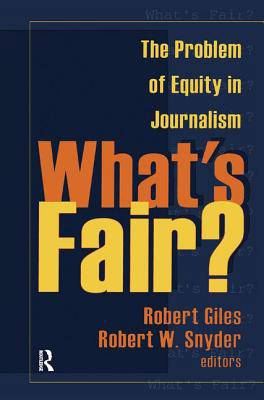
- Retrait gratuit dans votre magasin Club
- 7.000.000 titres dans notre catalogue
- Payer en toute sécurité
- Toujours un magasin près de chez vous
- Retrait gratuit dans votre magasin Club
- 7.000.0000 titres dans notre catalogue
- Payer en toute sécurité
- Toujours un magasin près de chez vous
Description
What's fair? It is an old question in journalism. In 1999, it seems more difficult to answer than ever. The cycle of story, spin, and counterspin that surrounds the White House is only the most obvious part of the problem. In the past 25 years, the practice of journalism has changed enormously--particularly in the United States. The demarcation of public and private life that once ruled certain kinds of stories out-of-bounds has eroded, leaving reporters with the unenviable challenge of having to cover events whose seaminess inevitably taints all who touch them. Commercial pressures, and a tidal wave of information and entertainment media, have engulfed the news business--leaving the definitions of journalism and journalistic standards vague and uncertain. And the technology of news reporting is speeding up news cycles in ways that leave little time for sober and measured judgments.What's Fair? is a collection of essays from experts in the field that are sure to spark compelling questions and ideas about journalism and its place in our time. In "Fairness--A Struggle," journalists explore a subject that they normally share only with close friends and colleagues--their own struggles with fairness that occurred in places as different as South Africa, Washington, and the South Bronx. In "Fairness--A History," nine contributors examine the history of the fairness question, specifically the establishment of the Hutchins Commission report of 1947, which is evaluated here by a historian, a journalist and a First Amendment authority. In a comparative vein, two authorities on international communications law examine British regulations for fairness in broadcasting at the end of the 20th century. In "Fairness--A Goal," contributors explore what struggles for fairness mean in a variety of contexts, from American newsrooms to post-Communist Poland to Northern Ireland.Many discussions of fairness are either numbingly abstract or impossibly righteous. To avoid those hazards, Robert Giles and Robert Snyder have grounded this volume in stories--the kind of stories journalists tell each other and the kind of stories people tell about journalism. This volume is a testament to journalism that is free yet fair, probing yet credible and authoritative in content yet open to many voices.Robert Giles is editor-in-chief of Media Studies Journal, senior vice president of the Freedom Forum and executive director of Media Studies Center. Formerly the editor and publisher of The Detroit News, he is the author of Newsroom Management: A Guide to Theory and Practice.Robert W. Snyder is editor of the Media Studies Journal, a historian, and most recently author of Transit Talk: New York's Bus and Subway Workers Tell Their Stories. He has taught at Princeton University and New York University, from which he holds a doctorate in history.
Spécifications
Parties prenantes
- Auteur(s) :
- Editeur:
Contenu
- Nombre de pages :
- 184
- Langue:
- Anglais
- Collection :
Caractéristiques
- EAN:
- 9781138540460
- Date de parution :
- 28-06-18
- Format:
- Livre relié
- Format numérique:
- Genaaid
- Dimensions :
- 152 mm x 229 mm
- Poids :
- 417 g

Les avis
Nous publions uniquement les avis qui respectent les conditions requises. Consultez nos conditions pour les avis.






